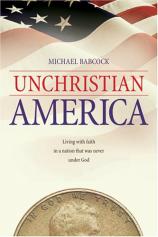Reading Group Guide
Discussion Questions
UnChristian America: Living with Faith in a Nation That Was Never Under God

Chapter 1: The Battle Is Engaged
1. Chapter 1 identifies several areas in which the goals of the Christian Right never fully matched its achievements. Discuss what you think are the greatest failures and the greatest successes of the Christian Right over the past three decades.
2. Do you agree that --- the mixture of politics, religion, money, and influence leads inevitably to compromise (page 36)? Why or why not? Discuss your reasons.
3. On page 20 we read, --- That year I proudly cast my first vote as an eighteen-year-old for Ronald Reagan. Recall when you cast your first vote. What were your thoughts, hopes, and expectations?
4. Do you agree or disagree with the following statement from page 32? --- In retrospect, the Clinton years (1993–2001) underscored the fallacy that there is a ‘moral majority‘ in America.
5. Do you think it‘s true that voters will inevitably choose --- competence over --- morality? How do you personally select which candidate to vote for?
6. Personal Application: Political values are shaped by family background, socioeconomic status, educational level, and social affiliations (including church). What factors have shaped your political values and beliefs the most?
Chapter 2: How Christian a Nation?
1. Why do you think it‘s important for many Christians to defend the idea that America is a --- Christian nation?
2. Discuss the dangers of labeling anything --- Christian except individuals who have committed their lives to Christ (see discussion on page 56). Are there better ways to describe --- Christian organizations?
3. Three types of arguments --- historical, cultural, and theological --- are presented in this chapter to challenge the idea that America is a Christian nation. Briefly review the central arguments and discuss what you believe are the strongest points and why.
4. On page 59 we read the following: --- The church is not bound to any one nation‘s agenda; rather, the church transcends man-made boundaries of culture and politics. How is this true, and how can this be possible when we all come from distinct national backgrounds and cultures?
5. The claim is often made that our national wealth is a sign of God‘s blessing and favor. Discuss the problems with this view in light of historical and biblical examples.
6. Personal Application: If America is not a Christian nation, what impact should this have on how you live?
Chapter 3: Rethinking the Shining City
1. Discuss the positive and negative aspects of each of the following American myths: the myth of utopia, the myth of self-reliance, and the myth of pragmatism.
2. Why is self-reliance such a seductive myth for American Christians? Discuss how Christians at other times and in other cultures (the Roman Empire, contemporary China, etc.) might bring a completely different perspective to our American belief in self-reliance.
3. What are some of the ways that the --- spirit of pragmatism has swept over the evangelical church in recent years? (See discussion on pages 95–96.)
4. Discuss the difference between --- practicality (doing things effectively) and --- pragmatism (a philosophy of truth).
5. Central to this chapter is the analogy between ancient Rome and modern America. What are the most important lessons you draw from this extended illustration?
6. Personal Application: This chapter discusses three American values or myths --- utopia, self-reliance, and pragmatism. Which of these three ideas has the strongest hold on you and why?
Chapter 4: The Long Defeat
1. The chapter opens with a story of a skeptic at a barbecue. Discuss your own experiences with skeptics and unbelievers. What were some of the objections they raised to your faith? How did you respond?
2. Why do you think we‘ve seen an upswing in --- militant atheism as we enter the twenty-first century?
3. On page 130 we read the following: --- We‘d be drawing the wrong lesson from our ‗long defeat,‘ however, if we completely disengaged from the world as though there‘s nothing left worth fighting for. Why is disengagement the wrong response to culture? What is the biblical answer for those Christians who want to disengage completely from the world?
4. Martin Luther is cited (pages 127–129) as an example of a Christian who directly challenged the truth claims of his culture with the authority of God‘s Word. What are some other historical examples? What are some biblical examples?
5. How long of a view of history do we typically have as individuals? As a culture? Look for examples from the Bible in which the nation of Israel had a shortsighted view of its own history. What were the consequences of this?
6. Personal Application: What does taking the --- long view of life mean for you in your own spiritual walk with God?
Chapter 5: Back to the Beginning
1. How can we grow in our faith even as we keep coming back to the beginnings of our relationship with Christ? Why is it important to always --- come back to the beginning of our faith personally? How does Paul illustrate this principle in his life and ministry? (See the discussion on pages 136–138.) 2. Discuss why it‘s important for Christians to come --- back to the beginning of Genesis 1. Why is the creatorship of God the starting point for all we believe?
3. Discuss how the church today needs to go back to the beginning, and recall how the church was founded. Review the four distinctives of the early church discussed on pages 150–156. Compare the early church with the twenty-first century church. Is the church today strong or weak in these four distinctives?
4. Discuss the list of five biblical principles on page 140 for how Christians are to relate to civil government. Which of these five points challenges you the most personally?
5. Much talk radio engages in crude satire and outright mockery of those in political authority over us. How do you see this in light of the scriptural commandment to --- honor the king and respect those in authority?
6. Personal Application: What are the some of the things God has used in your own personal life to bring you back to the beginning of your faith --- that is, back to the things that are basic?
Chapter 6: What's Worth Fighting For?
1. Do you agree with the statement that life is --- the prime value of the Christian faith (page 164)? Discuss and explain what this means.
2. Review the contrast between the two views of life (pages 165–171). How do we as Christians sometimes undercut, or even deny, what we say about life by the way we actually live?
3. If life is a gift from God (see page 170), then do we really have a --- right to life? Are there more effective --- and more biblically accurate --- ways to express our commitment to the sanctity of life?
4. Do you agree with the assertion made in this chapter that many evangelicals are pulling back from their traditional opposition to abortion? Is the long-standing controversy about abortion leading some to redefine what it means to be pro-life? Discuss the positive and negative aspects of broadening the definition of pro-life to include more than just the abortion issue. (See especially pages 176–180.)
5. Discuss the following statement: --- Our positions on the great controversies of our day should not be determined by a voting guide or the policy positions of conservative think tanks; they should be determined by the character and nature of God (page 186). How should our view of life be shaped by our knowledge of God‘s character?
6. Personal Application. In what ways does your own life affirm life? Promote life?
Chapter 7: A Simple Call to Virtue
1. Discuss how we can live out our faith and the values of the Sermon on the Mount in the stress and pressure of everyday situations --- for example, when somebody cuts you off in traffic as you‘re commuting to work or while waiting in line at the grocery store behind slow customers.
2. Look back over the sections on political, economic, and religious paradigms. Identify some of the ways that Kingdom living rejects the world‘s values concerning power, wealth, and knowledge. (Be specific!)
3. Why is a commitment to nonviolence not the same thing as pacifism? (See the discussion on page 201.)
4. On pages 203–204 we read the following statement: --- We can love our country and be good citizens without falling into the trap of nationalism. How do you react to this statement? In what ways is nationalism a trap?
5. Review how God does things (pages 209–211) first in individuals, and then in families, communities, and throughout the world. What encouragement do you find in this sequence of action?
6. Personal Application: What is one area in which you‘re most challenged in living out a sincere, authentic faith before the world?







